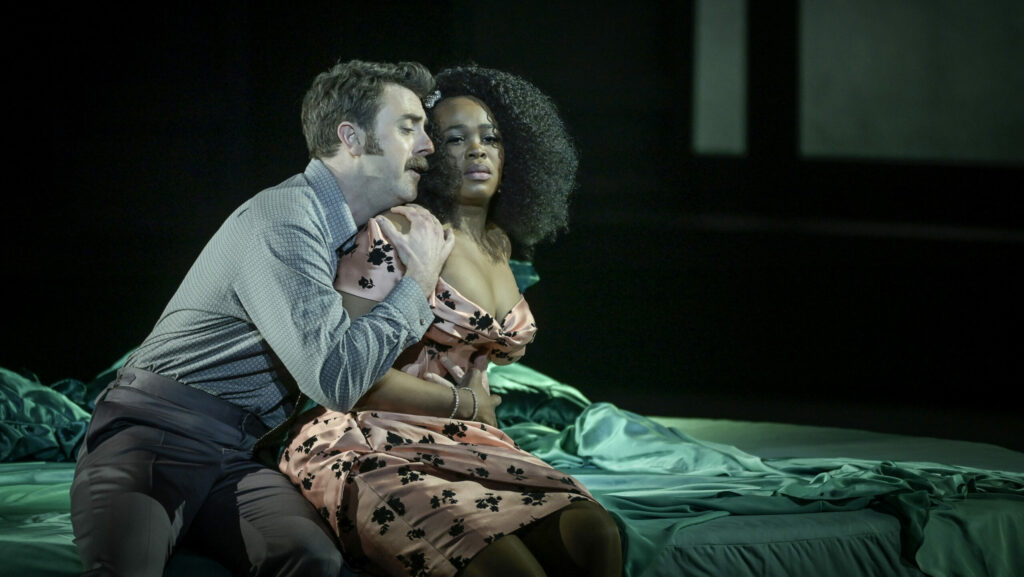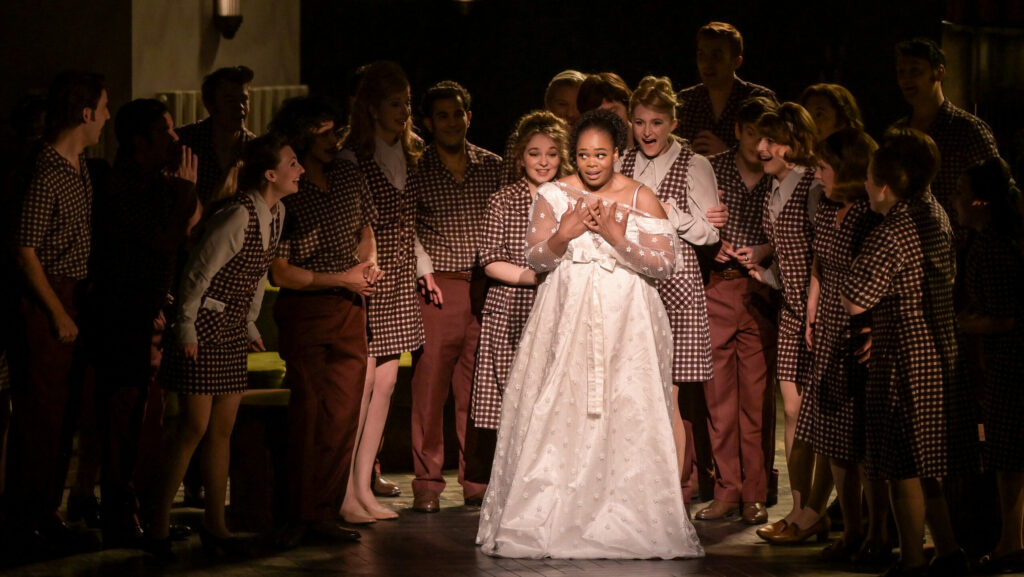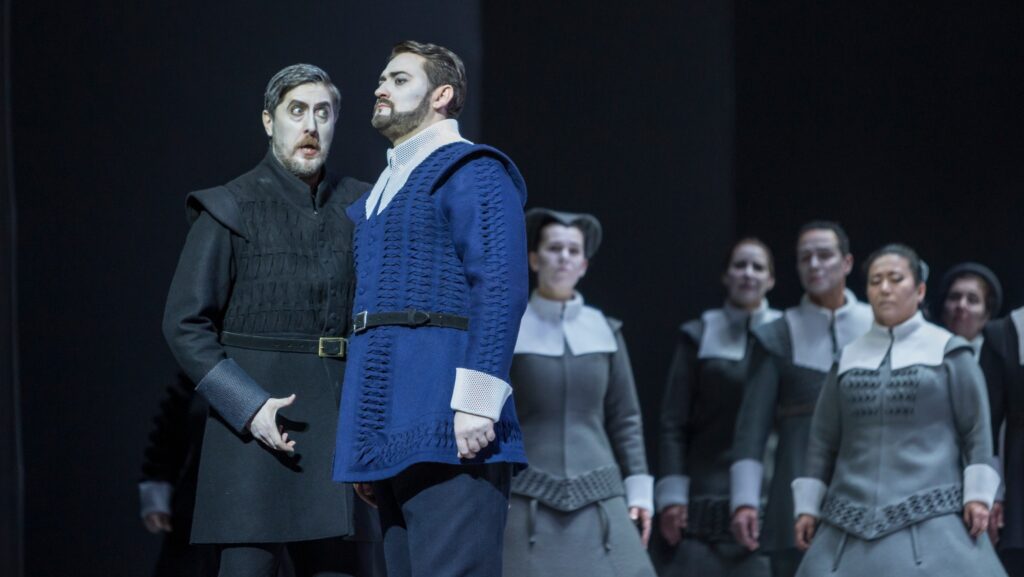
Vincent Pontet
Kansas-native Ben Bliss made a distinguished company debut as Jupiter at the Champs-Élysées in George Frideric Handel’s Semele. Oliver Mears’s production recasts antiquity for a circa-1960s luxury hotel, with the court of Thebes as its bellhops and chambermaids and the Olympians as its proprietors. Decked out in swanky tailoring and wide, patterned ties, his Jupiter was more lothario mogul than lovestruck deity, prowling his property for his next conquest and, under Somnus’s spell, assaulting his pregnant lover. (The assault, though played convincingly and with great seriousness, nonetheless elicited a few hearty chuckles—#MeToo may still be held up in customs.)
As menacing as his stage presence could be, his tenor never lost its dulcet qualities. His sound was open and easy, combining brightness with brawn across the role’s low-lying tessitura. “I must with speed amuse her”—an earworm if ever there was one—was properly energetic, as his approach to its many vocal runs was buoyant and precise. “Where’er you walk” was lush and meltingly tender. Among the evening’s vocal performances, his was the most invigorating.
South African soprano Pretty Yende made her role debut as Semele, the doomed object of Jupiter’s affections. Yende has gained a firm foothold in the French cultural scene in recent years, serving as a global brand ambassador for Dior and performing at the reopening of Notre Dame de Paris. The public’s response to her performance here was enthusiastic. Yet, the performance felt like a work in progress.
At various points, she seemed to mark her notes and pull her sound back, making for tentative phrasing. While “Oh sleep, why dost thou leave me” was beautifully floated, it often veered flat—indeed, her intonation was erratic throughout the evening. Her suddenly centered, full-bodied take on “No, no, I’ll take no less,” her final aria, made me wonder if she had held back in previous Acts to convey the character’s claiming of agency; if so, it was unsatisfactory on a musical level. Still, she is a compelling stage actress; her Semele’s vulnerability was palpable.
Sporting an absurd beehive hairdo, a lit cigarette, and a vindictive sneer, British mezzo-soprano Alice Coote as Juno seemed to have sauntered out of particularly pulpy Tennessee Williams drama. Some uneasy transitions between her middle and upper registers notwithstanding, her sound has retained its richness. She plumbed the libretto’s colorful text to its full effect, especially in her Act III manipulation of Semele in the guise of Ino, here staged as an eerie ventriloquy act. Fellow Brit Brindley Sherratt brought a secure bass to the dual role of Cadmus, Semele’s father, and Somnus, the god of sleep. He was particularly game in the latter role, delivering his aria from a decrepit bathtub amid a rubbish pile in nothing but a tuxedo jacket and a pair of dirty briefs. He appeared in the same briefs for his curtain call.

Vincent Pontet
Armenian soprano Marianna Hovansiyan, a member of the current Jette Parker Artists Company at The Royal Opera, was Iris. Her pert, piquant soprano shimmered through the trills of “There, from mortal cares retiring,” though her uneven phrasing in the recitatives could use refining. Irish mezzo-soprano Niamh O’Sullivan brought distinctive coloring to the largely thankless role of Ino, and Italian countertenor Carlo Vistoli sang with blazing intensity through an indignant, potent interpretation of “Despair no more shall wound me.”
Conductor Emmanuelle Haïm led her ensemble, Le Concert d’Astrée, through an animated, expressive reading of Handel’s score. They produced some of the most cohesive ensemble playing I have heard in a while. Mears’s production, which transfers along with this cast to the Royal Opera House in June, largely forgoes sex hijinks and Baroque rompery for a darker dissection of class politics, though with the occasional nod to the libretto’s mythical setting and inherent sense of humor. An opening tableau that sees Semele sweeping the cinders from a fireplace under Jupiter’s leering eye returns in disturbing fashion in the opera’s closing bars. The production’s message is clear: les aristocrats, on les pendra!

Sébastien Mathé
Across town, Americans Lisette Oropesa and Lawrence Brownlee were filling the cavernous Opéra Bastille in Laurent Pelly’s 2013 production of I puritani by Vincenzo Bellini, here directed in revival by Christian Räth. In its narrative simplicity, Bellini’s final opera can come across as little more than exquisite scaffolding for a mad scene. And Pelly concedes this point: sets by Chantal Thomas consisted of a series of wrought iron frames and stairwells providing the outlines of the fortress’s battlements and the chambers, its many negative spaces leaving the characters vulnerable to the forces without and within. Stiff woolen skirts and doublets in various shades of grey and black paired with flat collars and capotains—costumes by the director—evoked the period. White powder makeup and the choir’s regimented movements underscored the austerity of the Puritan Roundheads.
The role of Elvira is daunting in its vocal demands, and, in this production, she is onstage for almost the entire evening. Luckily, Oropesa was up to the challenge, whirling around the scaffolding in the throes of increasing mania. Her vocal stamina, too, was admirable, as she handled the intricacies of the coloratura with verve and let loose some resounding acuti, even in the final act. Oropesa’s solid technique—proper vowel alignment and abundant appoggio, chiefly—has afforded her the ability to flesh out a myriad of hues across her register.
Her most impactful moments came not during the trills or runs, which were nonetheless impressive and made for a thoroughly delightful “Son vergin vezzosa,” but in the legato passages, where her sighs unveiled the full vibrancy of her instrument. She did have a tendency, however, to go sharp, which became apparent in the exposed sections of “Oh, vieni al tempio.” And her mad scene, while dazzling technically, never quite summited the peaks of dementia; Pelly’s production has our Manic Puritan Dream Girl severely neurotic from the start, perhaps blunting the impact of the opera’s central set piece.
As Arturo, her Cavalier lover, Brownlee likewise displayed strong technique and a thorough understanding of the bel canto style. His warm, fine-grained tenor bloomed through the arching lines of “A te, o cara,” and his top rung through the ensemble, making it one of the loveliest moments of the evening. His “Credeasi misera” was so well supported and expansive that I was surprised that he did not attempt the high F, which he has elsewhere proven to be perfectly capable of hitting. No matter—it was still deeply felt without the stunt note. New Yorkers are in for treat when Brownlee and Oropesa reprise their roles in the Metropolitan Opera’s New Year’s run of this work.

Sébastien Mathé
Ukrainian baritone Andrii Kymach’s rough-hewn sound made Elvira’s aversion to the seemingly decent Sir Riccardo understandable. There was little in the way of phrasing to his Act I lament “Ah! Per sempre …Bel sogno beato,” as he went from loud to louder with a few choppy transitions in between. In contrast, Italian bass Roberto Tagliavini as Sir Giorgio, Elvira’s kindly uncle, conducted a masterclass in Italianate singing, combining a rounded, caramelly tone with clear textual accentuation and expressiveness. Dutch mezzo-soprano Maria Warenberg, a current member of the Paris Opera Troupe, showed promise as the imperiled Enrichetta, possessing a prune-hued timbre and ample dexterity.
Following a pedestrian accounting of the overture, conductor Corrado Rovaris rallied the Orchestre de l’Opéra national de Paris for a spirited, unfussy performance. The tempos were crisp, and the sound was overall balanced. The horns were suitably blazing during “Suoni la tromba.” Chorus master Ching-Lien Wu also delivered fine work with her ensemble; the women’s chorus was particularly strong.
For this American, Paris provided much to admire and enjoy: relatively clean streets, an efficient metro, and sheer urban beauty. But beyond its boulevards, I will remain envious of the seriousness and care with which the city treats its operatic programming.



